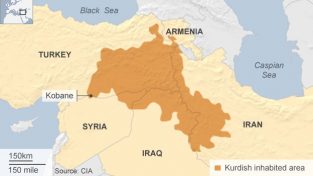Loyalty matters, in word and deed
Related Posts
CNN recently featured a compelling story in the form of an open letter to Kurdish soldiers from the grateful wife of an active-duty American Special Operations soldier first deployed to the Middle East in 2003. She wrote about the profound impact of the help of the Kurdish people during the invasion of Iraq and since:
[My husband] told me stories of how the Kurdish people in Northern Iraq supported the troops, advised them, stood by them, fought shoulder to shoulder with them in combat, and became allies and friends. And I became grateful – immensely, unwaveringly, and forever grateful for you.
Since then, the word “Kurds” in my home has meant something. It has meant “ally” and “friendship.” …
The Kurdish people are not nameless, faceless people across the world. You hold a place of honor and respect in our home. …
But now, I watch the news in horror. I see promises broken, progress destroyed, years of hard work and unimaginable sacrifice gone in a tweet. I see allies betrayed, their faces in my picture frame. While watching the news, my children turn to me and ask if those are our friends and I say yes. They have looks of confusion on their faces.
In announcements last month around his decision to pull U.S. troops out of Syria, the president suddenly began to refer publicly to our Kurdish allies in the region – our longtime partners and, often, protectors in battle – as though they were incidental. Having made them anonymous through repeated dismissive references to “the Kurds,” he then made insulting comments about them as a group, acknowledging neither their humanity nor their contributions and sacrifices as our allies over many years.
The president’s regrettable words made it possible for us, as a country, to allow peaceful people who had established their own territory to be mowed over and pushed aside. Pulling out of the part of Syria where our Kurdish allies live is an offense against humanity. It’s not about political party – it’s about loyalty and doing the right thing to save lives in difficult circumstances.
A bit of background on the Kurdish people
 From BBC: The Kurds are one of the indigenous peoples of the Mesopotamian plains and the highlands in what are now south-eastern Turkey, north-eastern Syria, northern Iraq, north-western Iran and south-western Armenia.
From BBC: The Kurds are one of the indigenous peoples of the Mesopotamian plains and the highlands in what are now south-eastern Turkey, north-eastern Syria, northern Iraq, north-western Iran and south-western Armenia.
Today, they form a distinctive community, united through race, culture and language, even though they have no standard dialect. They also adhere to a number of different religions and creeds, although the majority are Sunni Muslims.
This BBC article covers the history of the Kurdish people from soon after WWI, when they were on the way to having their own state, Kurdistan. However, the commitment to recognize a Kurdish state soon fell apart, and from then until now, there have been many disappointments and broken promises.
Over the past five years, I have been privileged to get to know a man who is Kurdish, from Northern Iraq. He is one of the most decent, caring people on Earth. Although he has seen the brutality of war, my colleague has remained soft-spoken, kind, and a believer in humanity and our future. A physician and public health practitioner and educator, he has more than 17 years’ experience designing, implementing, supervising and monitoring health projects and programs during and after complex humanitarian emergencies in conflict zones in the Middle East. In these troubled and dangerous times, he could have continued to do much from his post here to support the health and safety of vulnerable people in an unstable region. Sadly, he got ensnared in the immigration web and, with time running out, had to leave the U.S. We pray for his and his family’s safety and the safety of all those in harm’s way due to the ongoing crisis in Syria and the region.
Barbara
The views expressed in this blog are Barbara Rimer’s alone and do not represent the views and policies of The University of North Carolina or the Gillings School.
